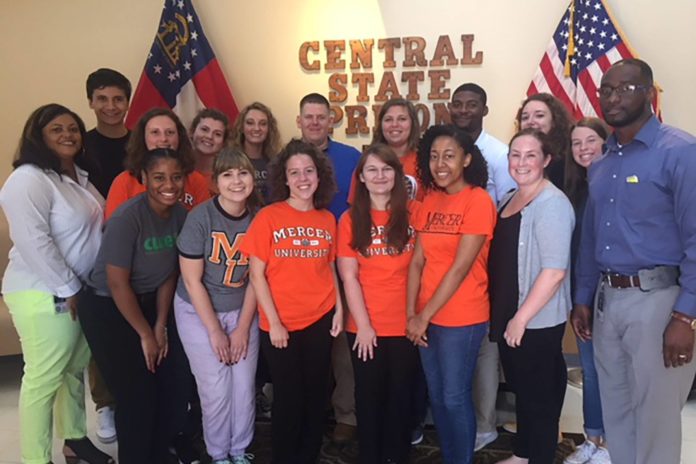Mercer University encourages students to participate in “Research that Reaches Out,” and one recent example of this mantra involves a collaboration between the Integrative Core Curriculum (INT) 201 program and Central State Prison in Macon.
Dr. Sara C. Appleby, assistant professor of psychology, and Dr. Lori A. Johnson, associate professor of political science, worked together to bring the internationally-recognized Inside-Out Prison Exchange Program to the Macon campus.
According to its website, the Inside-Out Prison Exchange, which recently celebrated its 20th anniversary, “is an educational program with an innovative pedagogical approach tailored to effectively facilitate dialogue across difference.”
Central State inmates, known as the “inside students,” and Mercer students, known as the “outside students,” both participated in an INT 201 course on “Building Community” during the fall semester.
“The class met once a week and explored some of the core issues of the criminal justice system,” Dr. Appleby said. “Both inside and outside students learn side by side, as equals, about the intersection of community and the criminal justice system.”
The 16-week program, with 14 outside students and 11 inside students, began last September.
Johna, a criminal justice major at the University, said the course gave her an entirely different outlook on the criminal justice system. To protect the privacy of all students, the class used first names only.
“The inside students were the most innovative, passionate and intelligent group of students I’ve ever met,” she said. “From the introductory class, I knew they were going to teach me so much more than textbooks ever could about prisons, laws, and even life.”
The program allowed Johna to see the reality of the prison system, rather than what many perceive it to be, as well as the stigma associated with those who are incarcerated that makes it difficult for them to return to society.
“Our current system consistently degrades people who are incarcerated, forcing them to live in complete isolation from society with little to no resources to assist them in their reintegration back into the general public,” she said.
“This simply is not the system of rehabilitation that America claims, and the inside students in my class helped me to realize that. I would not have been able to form an educated opinion about the criminal justice system and the way in which it functions, and I certainly would not have found my passion for reforming the system and teaching others about it, as well.”
One of the most gratifying aspects of the program was to see the profound effect it had on both the inside and outside students, Dr. Appleby said.
“It was incredible to see the transformation and lasting impact the program has had on both sets of students,” she said. “This course took place in an all-male prison, but we recently received approval to expand the program to Pulaski State Prison for women in Hawkinsville, and the course will be taught by Dr. Johnson.”
Each session gave Johna new insight into the criminal justice system, encouraging her to find ways in which she can help improve the system.
“It was a truly life-changing program that has given me a newfound passion for the criminal justice system and those who are affected by it, both directly and indirectly,” she said. “Each class period provided me with more insight into the flaws of the current system.”
Information will soon be posted around campus for students interested in participating in the next cohort of the program. Prior to registration, perspective students will need to fill out an application and submit it to Dr. Appleby or Dr. Johnson.
“Students will be asked a few questions about why they want to take this class and how it fits into their future plans,” Dr. Appleby said. “Given that this is an INT course, we prioritize having a diverse group of students in terms of majors and career goals.”









